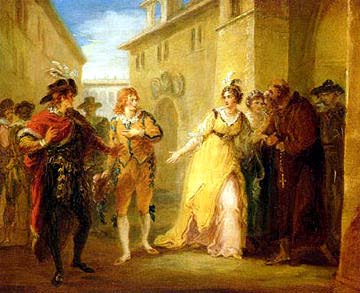It’s easy to find what Shakespeare said on various subjects related to love and romance. But how about going in a different direction – what are some of your favorite death quotes? I’m not talking about the “And now I will kill you” sort of stuff, I’m talking about stuff said in mourning, in praise and tribute to the deceased, and so on. The kind of thing that you might say to a grieving loved one, use in a eulogy, write in a sympathy card, and so on. Disclaimer : This post is motivated entirely by curiosity, I have no personal crisis for which I need eulogy material. One of my favorites, from King John: Grief fills the room up of my absent child,
Lies in his bed, walks up and down with me,
Puts on his pretty looks, repeats his words,
Remembers me of all his gracious parts,
Stuffs out his vacant garments with his form;
Then, have I reason to be fond of grief? I know that the original context is far too heated and angry to be appropriate, but taken by itself I see this passage as something very comforting. Switch out that final question mark for a period and it says something completely different. For something shorter and sweeter, and bordering on cliche, there’s always “Flights of angels sing thee to thy rest,” from Hamlet. What else?
Month: August 2010
Which Play Is The Most Romantic?

Going over edits for my Shakespeare wedding quotes book, I’m curious about which play provided the most romantic quotes. That’s a fairly arbitrary measure, of course, but it’s an interesting question. I’m not thinking of the storyline. I mean, which play has the most passages that you could pull out of context and use elsewhere and still have them sound romantic?
From where I sit, As You Like It and A Midsummer Night’s Dream both have a great deal of stuff to say on the subject of love and romance. But they’re both … light? about it. Neither, in my book, expresses the sort of ups and downs that come with what love’s really all about. Don’t get me wrong, A Midsummer Night’s Dream is damned near perfection from some angles, but half the time, the lovers are in the grip of a magic potion and in love with the wrong person. As You Like It, I find just too corny. Cute but corny. Life’s not as easy as that one makes it out to be.
I think I’ll put my money on Twelfth Night. I love the discussion we had on music being the food of love. Orsino has got some amazing insight about what love’s really all about, and that place where it can actually cause you pain, and yet you still want more of it.
“They are in the very wrath of love, clubs cannot part them.”
“Love sought is good, but given unsought is better.”
Expectation Is The Root Of All Heartache

The origin of this quote, in this form at least, is unknown – but it is not Shakespeare. No one has been able to find a reference in Shakespeare’s works to these words, though it is a matter of opinion whether you might find something similar that Shakespeare said, that has evolved into the above.
Actually, this quote closely resembles the Second Noble Truth of Buddhism, which is often expressed as “Desire is the root of all suffering.” What is expectation but desiring a certain outcome? If we do ever find an actual “source” for this quote it will be difficult to argue that they’re not just paraphrasing (or maybe even just translating) Buddha.
If you’d like to pursue that thread some more, you wouldn’t be the first person to consider a Shakespeare/Buddhism connection.
Subway Shakespeare
What can I say? I love the idea. Of course I’ve never had to sit through it before, with no control over who does it, what they do, and so on, so maybe it’s somewhat annoying. If a bunch of guys who looked equally likely to stick a knife in me did it, and then walked around passing a hat like they’d go ahead and take my wallet if I didn’t volunteer it, I might not be so crazy about the idea.
Understanding Shakespeare’s Word Frequencies
I saw this post already about Understanding Shakespeare using data visualization techniques, I’m just not sure how I feel about it. The play is presented as a grid of word clouds – characters across, acts and scenes down. The theory is that you can learn about a character’s progression through the play by looking at how their word frequency changes. Look, for example, at Hamlet. Tell me what you see? I can’t see anything enlightening, but maybe I’m missing it. I think what you could do with this is apply another level of semantic detail to it. Imagine if you could group all “light” and “dark” words together, and then look at Romeo and Juliet. Or Macbeth. Then, I think, you might start to see patterns. Or what if you could select out and compare usage of “you” versus “thou” in certain interactions between characters? I’m often told that this is a very important key to their relationships. There’s a version of this technique that somebody does every year where they do a tag cloud representing the current President’s State of the Union address. Over time, that’s fascinating. You see how some presidents spent more of their time talking about the Depression and economic issues, then some had to deal with war, Germany, Russia … all the way up to modern times where the word terrorism shows up and never goes away. I wonder if somebody could do Shakespeare’s usage over time, and see how his own vocabulary expanded. I think to be valid, though, we’d really need to know when he wrote everything, and I don’t think we can ever really know that.
